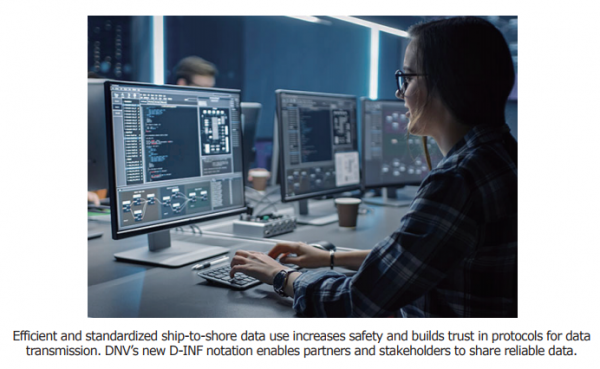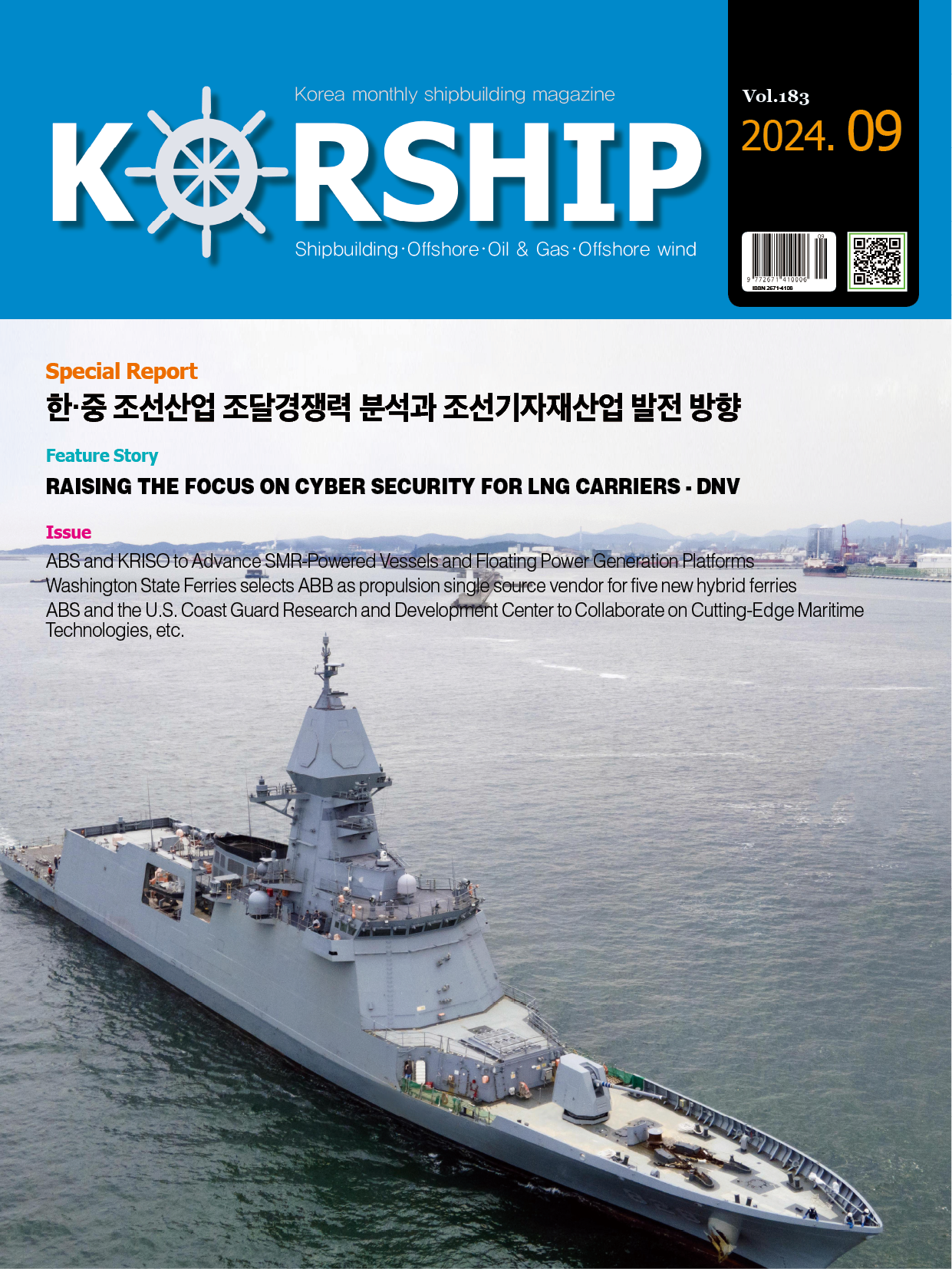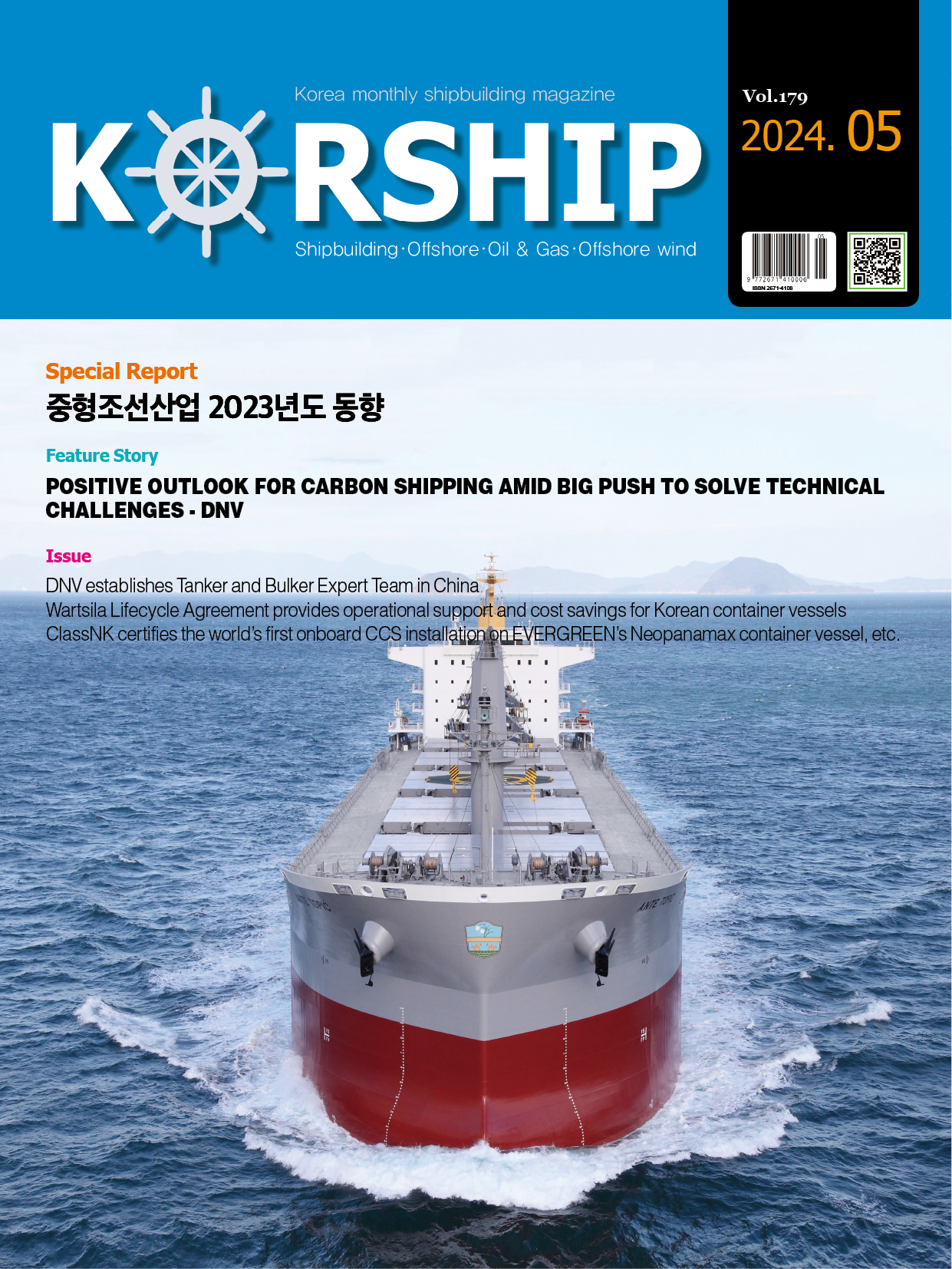Feature Story Supporting the industry towards best practice data exchange
페이지 정보
작성자 최고관리자 댓글 0건 조회 1,653회 작성일 22-09-15 19:26본문
Digitalization of the maritime industry is set to radically enhance the operational efficiency, safety and environmental performance of ships, but right now it is taking place in a fragmented way, with no pan-industry alignment on data infrastructure reliability and data quality according to global standards.
As ships get smarter and increasingly packed with sensors, the central onboard servers gather maintenance and consumption data from components and systems that typically feature different types of data handling. Lack of standardization, for example in time stamps and data format, means data cannot be combined in a uniform way, leading to a lack of trust in data and security risk. Is what you are receiving the true data?
Full-spectrum data verification
DNV’s D-INF notation solves this problem by setting out the requirements for the complete data collection infrastructure, including onboard data servers, data relay components and remote data servers, covering the full ship-to-shore communication framework. For class purposes it applies to on-board equipment that can be delivered by a shipyard, supplier or the vessel owner; however, it can also extend the trust class provides beyond the vessel.
“The notation is designed to facilitate safe, efficient and reliable vessel-to-shore data exchange and focuses on data extraction and collation, data quality, connectivity and security management. It is a key element on the road to standardized infrastructure and effective digital transformation at a time of rapid technology development. Standardizing maritime data infrastructure will enable the entire industry to improve and cooperate across systems, vessels and end-to-end logistic chains,” says Jarle Coll Blomhoff, Group Leader Cyber Safety & Security, Control & Bridge Systems – Ship Classification Maritime at DNV.

Curating trust through data verification
“With D-INF we are curating trust that the data gathered from the ship is the actual data that has been confirmed through a verified pipeline. This is vital for owners to build trust among value-chain stakeholders ranging from class and reporting authorities to insurance providers, financiers, cargo owners and charterers,” he adds.
DNV has verified the requirements as part of Approval in Principle(AiP) projects – the first stage of ongoing type approval – newly granted to China’s COSCO SHIPPING, Korean shipbuilder Samsung Heavy Industries(SHI) and technology vendor Kongsberg Digital for flagship digital solutions. The project with SHI focused on the infrastructure and data stream of its SVESSEL BIG system, while the Kongsberg pilot confirmed its Vessel Insight solution providing value-adding digital services for customers. The COSCO pilot formed part of a wider project with DNV to develop an onshore smart ship management centre to aggregate data from across its huge fleet.
First customers form “complementary angles”
“D-INF is the first step in moving the industry towards best practice in data exchange. Piloting the notation from three complementary angles – shipbuilder, ship operator and technology vendor – is unique and sets the standard for digital transformation in shipping,” says Blomhoff.
“We are pleased to be the first Korean shipbuilder to have received AiP from DNV for data infrastructure in compliance with the recent ISO standards. This standardization lays the groundwork for improved operational efficiency and flexibility for ship operators while enhancing our competitiveness in the digitalization market,” says Oh Seong-Il Senior Executive Vice President, Head of Sales Division at SHI.
“As an operator, it is crucial for our operational efficiency and safety to get up-to-date information about individual vessels and systems, as well as fleet. Such data is a valuable and cautious asset that can be used to improve the logistical efficiency of the whole supply chain. We believe our COSCO SHIPPING operational centre, which we have been developing in close cooperation with DNV since 2019, will be key in realizing this; however, we need access to standardized data to make this happen,” says Dong Guoxiang, Deputy Chief Engineer of SSSRI from COSCO SHIPPING GROUP.
D-INF notation as proof of highest quality and security levels
Vessel operators need to get access to quality data from their ships, with each one representing a unique configuration. Kongsberg’s Vessel Insight subscription service allows them to start standardizing their data collection and contextualization.
“The most important aspect of data collection is to keep and protect the integrity of the vessel operation. This is why we invest a lot in cyber security and class validation audit and verification. As D-INF is the first type approval certificate of its kind under DNV class, we are very proud to lead the way and get a certificate that proves that our product is of the highest level of quality and can be trusted by existing and potential clients and partners,” says Sondre Mortensvik, Vice President Digital Ocean at Kongsberg Digital.
Follow-up MoUs extend industry collaboration on data exchange
Recognizing that a strong technical standard is not enough and that the entire industry needs to play along, both SHI and Kongsberg Digital decided to deepen their cooperation and to actively contribute to the development of D-INF rules and support uptake by the industry.
“From our side we appreciate the close cooperation with DNV and their openness to take our feedback into account when forming their requirements and rules. To build efficient data infrastructure into a vessel with related shore infrastructure, all stakeholders need to contribute, from the component providers of data sources to onshore cloud infrastructure via the integrated vessel systems. We are confident that this close cooperation will support further improving our ship design and provide a digital platform for the vessels shipowners order from us,” says SHI’s Oh Seong-Il.
“Standardized and efficient use of the gathered data to improve safety, efficiency and environmental performance is not the responsibility of one party; it is key that all contribute. Only together can we realize the full potential that digital transformation brings to the maritime and offshore industry!” adds Kim Evanger, Vice President Maritime Partnerships at Kongsberg Digital.
Plotting a course to fully smart and digital class
DNV is offering D-INF as a key enabler of efficiency for digital class and assurance customers worldwide. The convenience of digital verification services will depend on the ability to transmit trusted data. It also means owners can buy a vessel knowing that all the digital elements talk to each other from delivery.
“Collecting data in a common infrastructure is a major step forward, especially in the case of large fleets. In addition, the infrastructure only has to be verified once for many different uses, allowing data from multiple sources to be shared with stakeholders and systems across all operations. It is also a powerful enabler of data analytics for enhanced vessel and fleet management,” explains Simen Sandelien, Principal Engineer, Cyber Safety & Security at DNV.
D-INF improves the relevance and quality of DNV services, and reinforces our common goal of zero down time due to regulatory and class requirements. The current classification portfolio includes Barrier Management, extended business assurance, Direct Access to Technical Experts(DATE), as well as our industry-first remote surveys available to all DNV-classed vessels through Veracity.
“Most class inspections still require surveyors to be physically present on board. However, customers who can share quality data can expand the amount of data we are able to access and offer even more class and assurance services digitally. This will help to streamline the survey inspection process by giving DNV access to data from the ship’s bridge, which can be used to assess the condition of key equipment and better understand hardware and software performance from onshore,” says Sandelien.
Supporting notations
D-INF is included in the new Digital Features chapter of DNV’s class rules that came into force on 1 January 2021. The rules are designed to enable efficient digitalization for customers and also include the “DDV”(data-driven verification principles for remote surveys) notation setting requirements for gathering, treatment and delivery of data to ensure data quality for use in a class assessment, and the “REW”(remote witnessing preparedness on network and connectivity) notation providing requirements for systems and solutions used in remote witnessing. An additional “Smart” vessel notation providing a framework for addressing and visualizing digital features was introduced at the same time.
The D-INF process involves the review of design documentation and testing systems in live simulation to ensure solutions fully meet the notation’s functional requirements, including data time stamping and formats, back-up and recovery, reliability, integrity and access rights and security. Manual sampling of data both in and out is done earlier while algorithms check data in the latter stages. DNV uses its Veracity connectivity network platform as the verification engine.
The notation can be obtained both as a proprietary D-INF(P) and standardized D-INF(S) solution, providing added flexibility for customers to also assure existing ship-to-shore solutions.
Spreading standardization through the vendor chain
Blomhoff adds that the optimal digitalization strategy for the future is for more source components to also be standardized enabling optimal data gathering through reliable links. “It is in everyone’s interest that all technology vendors are eventually on board with standardized data to make data exchange seamless. DNV aims to be technology agnostic and to apply given standards efficiently across the industry. Uniform data naming conventions will cement trust even more,” he concludes.
■ Source: www.dnv.com
- 이전글Explosion protection in separators Safety at 12,000g 22.09.15
- 다음글세계 LNG산업 및 LNG선 동향과 전망② 22.09.15












